Promoting Sustainability in Australia: A Comprehensive Case Study
VerifiedAdded on 2023/06/18
|9
|2087
|497
Case Study
AI Summary
This case study explores sustainability in Australia, highlighting the importance of adopting sustainable practices to protect the environment. It examines the code of conduct related to sustainability, focusing on how Australians can reduce their carbon footprint and contribute to a healthier environment. Two key theories, green economics and corporate social responsibility (CSR), are discussed, outlining their strengths and weaknesses in promoting sustainability. The study also proposes feasible, workable, and ethical solutions for companies and individuals to minimize their environmental impact, such as conducting environmental audits, implementing environmental management systems, and utilizing renewable resources. The report concludes that sustainability is crucial and emphasizes the need for collaborative efforts to ensure a sustainable future.
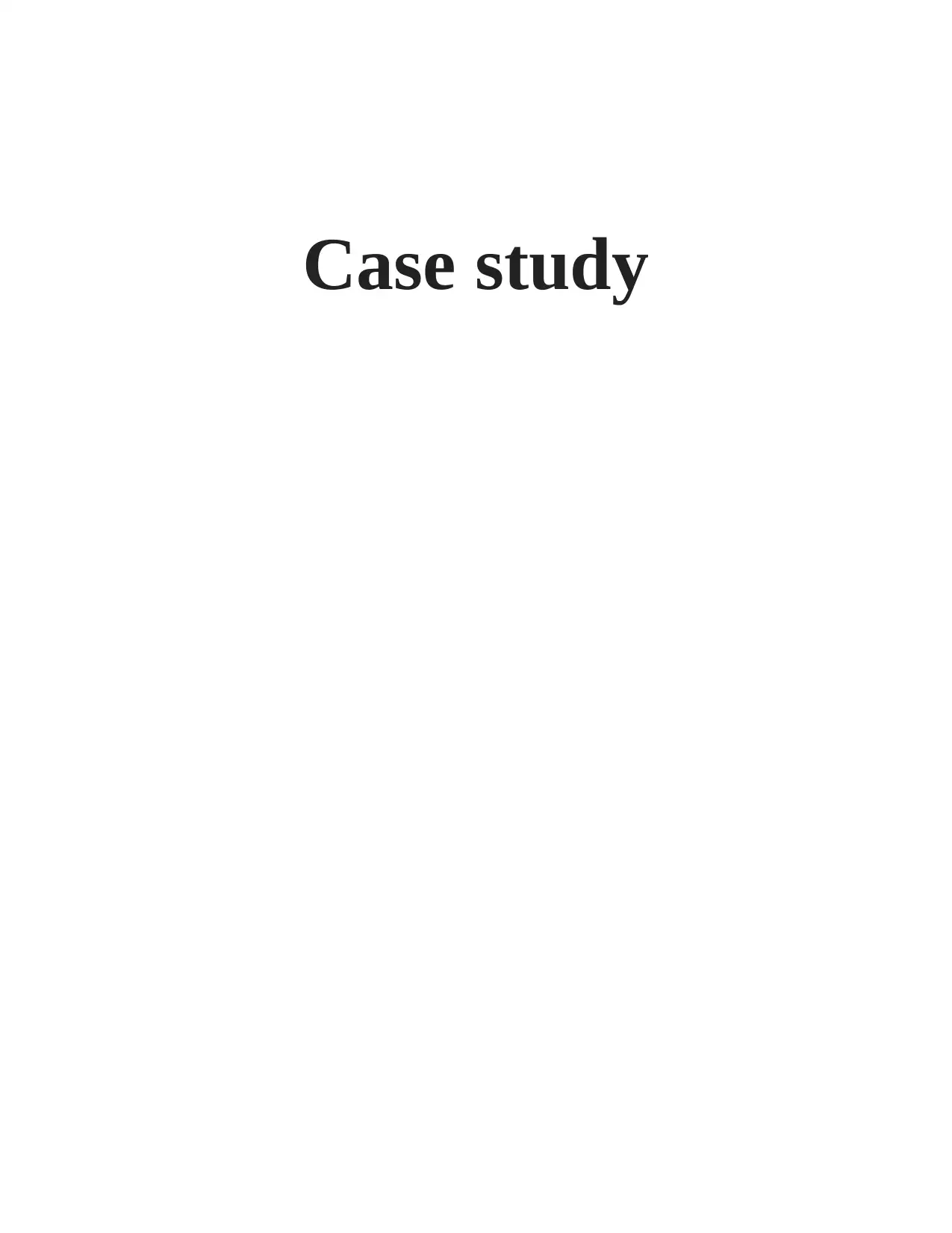
Case study
Paraphrase This Document
Need a fresh take? Get an instant paraphrase of this document with our AI Paraphraser
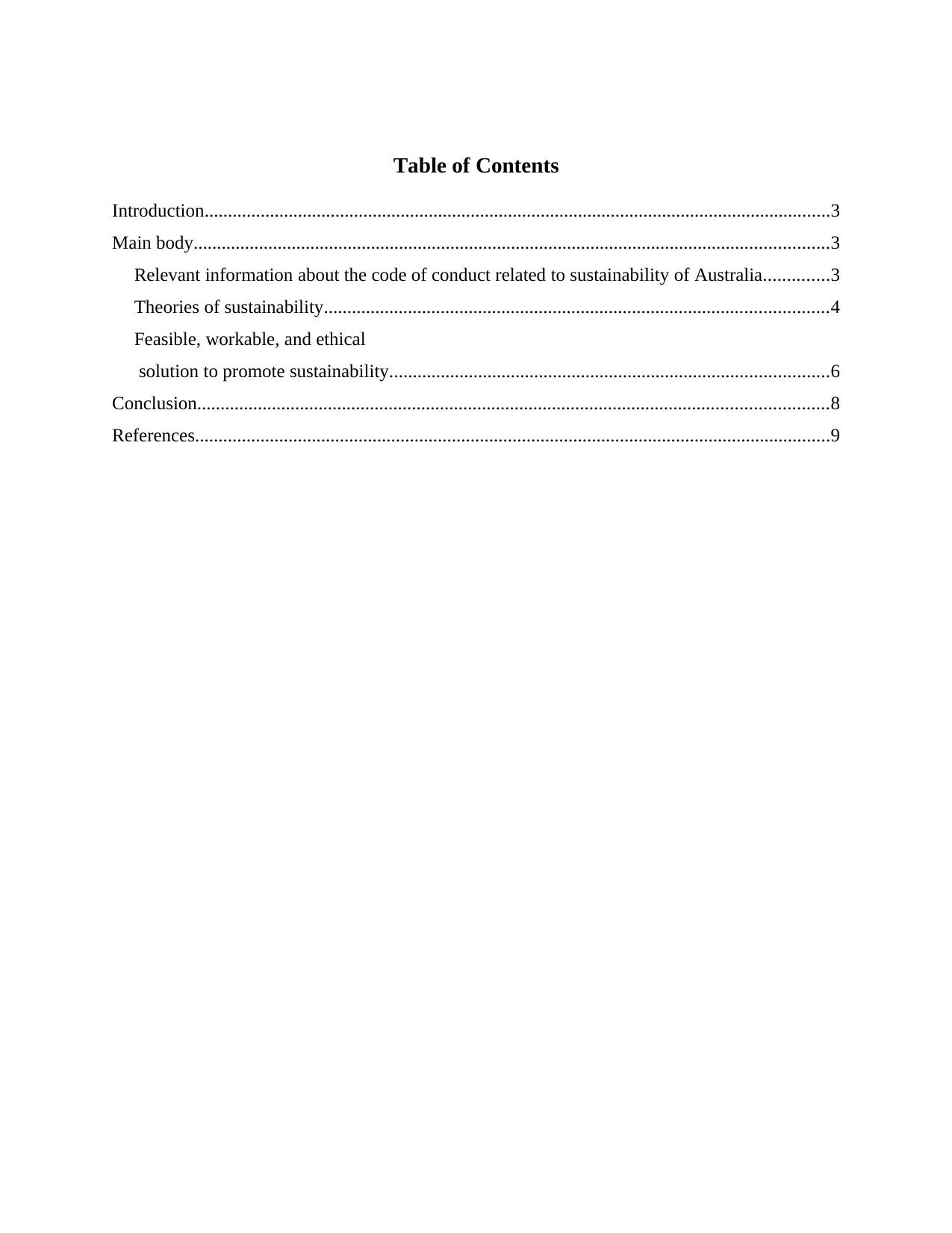
Table of Contents
Introduction......................................................................................................................................3
Main body........................................................................................................................................3
Relevant information about the code of conduct related to sustainability of Australia..............3
Theories of sustainability............................................................................................................4
Feasible, workable, and ethical
solution to promote sustainability..............................................................................................6
Conclusion.......................................................................................................................................8
References........................................................................................................................................9
Introduction......................................................................................................................................3
Main body........................................................................................................................................3
Relevant information about the code of conduct related to sustainability of Australia..............3
Theories of sustainability............................................................................................................4
Feasible, workable, and ethical
solution to promote sustainability..............................................................................................6
Conclusion.......................................................................................................................................8
References........................................................................................................................................9
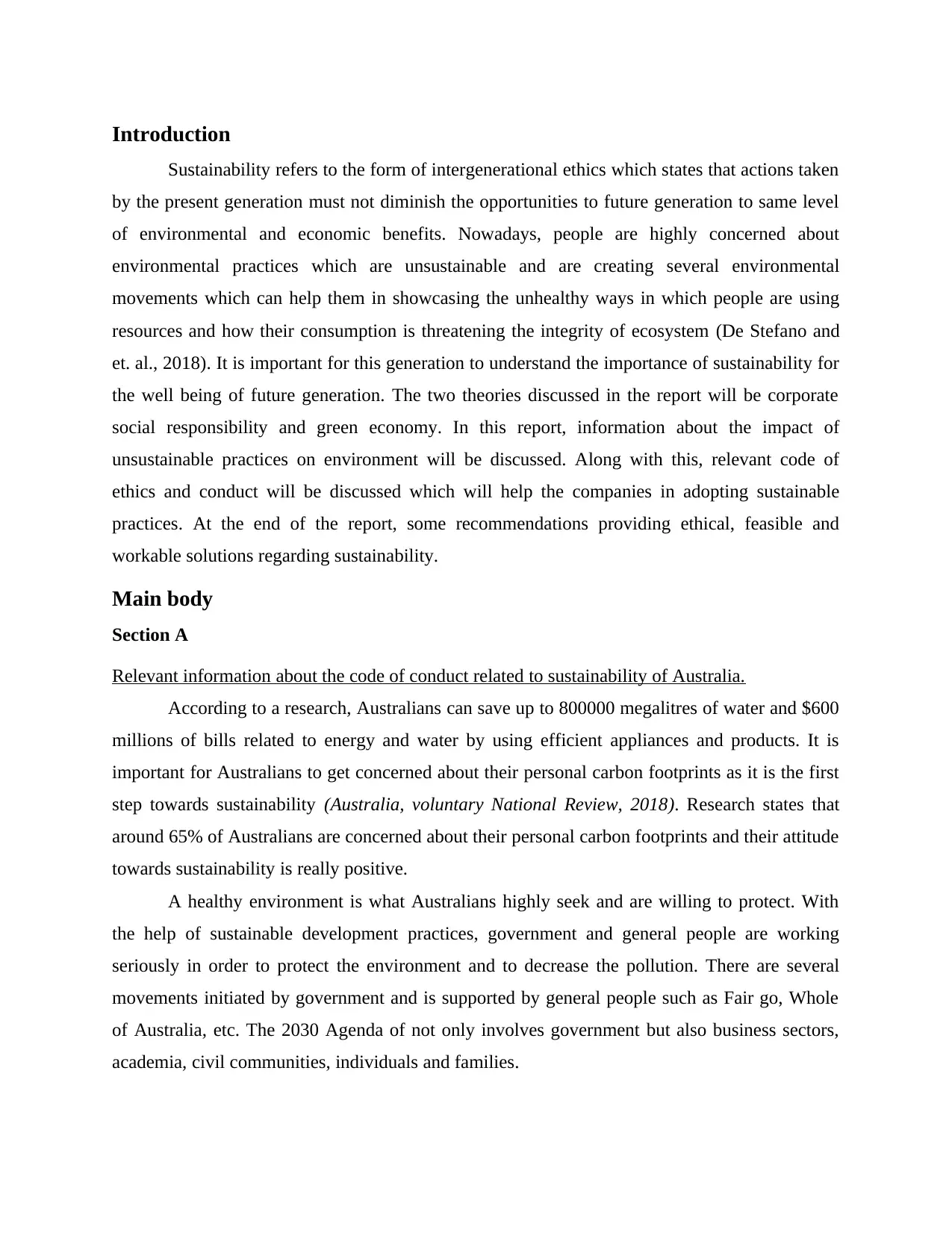
Introduction
Sustainability refers to the form of intergenerational ethics which states that actions taken
by the present generation must not diminish the opportunities to future generation to same level
of environmental and economic benefits. Nowadays, people are highly concerned about
environmental practices which are unsustainable and are creating several environmental
movements which can help them in showcasing the unhealthy ways in which people are using
resources and how their consumption is threatening the integrity of ecosystem (De Stefano and
et. al., 2018). It is important for this generation to understand the importance of sustainability for
the well being of future generation. The two theories discussed in the report will be corporate
social responsibility and green economy. In this report, information about the impact of
unsustainable practices on environment will be discussed. Along with this, relevant code of
ethics and conduct will be discussed which will help the companies in adopting sustainable
practices. At the end of the report, some recommendations providing ethical, feasible and
workable solutions regarding sustainability.
Main body
Section A
Relevant information about the code of conduct related to sustainability of Australia.
According to a research, Australians can save up to 800000 megalitres of water and $600
millions of bills related to energy and water by using efficient appliances and products. It is
important for Australians to get concerned about their personal carbon footprints as it is the first
step towards sustainability (Australia, voluntary National Review, 2018). Research states that
around 65% of Australians are concerned about their personal carbon footprints and their attitude
towards sustainability is really positive.
A healthy environment is what Australians highly seek and are willing to protect. With
the help of sustainable development practices, government and general people are working
seriously in order to protect the environment and to decrease the pollution. There are several
movements initiated by government and is supported by general people such as Fair go, Whole
of Australia, etc. The 2030 Agenda of not only involves government but also business sectors,
academia, civil communities, individuals and families.
Sustainability refers to the form of intergenerational ethics which states that actions taken
by the present generation must not diminish the opportunities to future generation to same level
of environmental and economic benefits. Nowadays, people are highly concerned about
environmental practices which are unsustainable and are creating several environmental
movements which can help them in showcasing the unhealthy ways in which people are using
resources and how their consumption is threatening the integrity of ecosystem (De Stefano and
et. al., 2018). It is important for this generation to understand the importance of sustainability for
the well being of future generation. The two theories discussed in the report will be corporate
social responsibility and green economy. In this report, information about the impact of
unsustainable practices on environment will be discussed. Along with this, relevant code of
ethics and conduct will be discussed which will help the companies in adopting sustainable
practices. At the end of the report, some recommendations providing ethical, feasible and
workable solutions regarding sustainability.
Main body
Section A
Relevant information about the code of conduct related to sustainability of Australia.
According to a research, Australians can save up to 800000 megalitres of water and $600
millions of bills related to energy and water by using efficient appliances and products. It is
important for Australians to get concerned about their personal carbon footprints as it is the first
step towards sustainability (Australia, voluntary National Review, 2018). Research states that
around 65% of Australians are concerned about their personal carbon footprints and their attitude
towards sustainability is really positive.
A healthy environment is what Australians highly seek and are willing to protect. With
the help of sustainable development practices, government and general people are working
seriously in order to protect the environment and to decrease the pollution. There are several
movements initiated by government and is supported by general people such as Fair go, Whole
of Australia, etc. The 2030 Agenda of not only involves government but also business sectors,
academia, civil communities, individuals and families.
⊘ This is a preview!⊘
Do you want full access?
Subscribe today to unlock all pages.

Trusted by 1+ million students worldwide
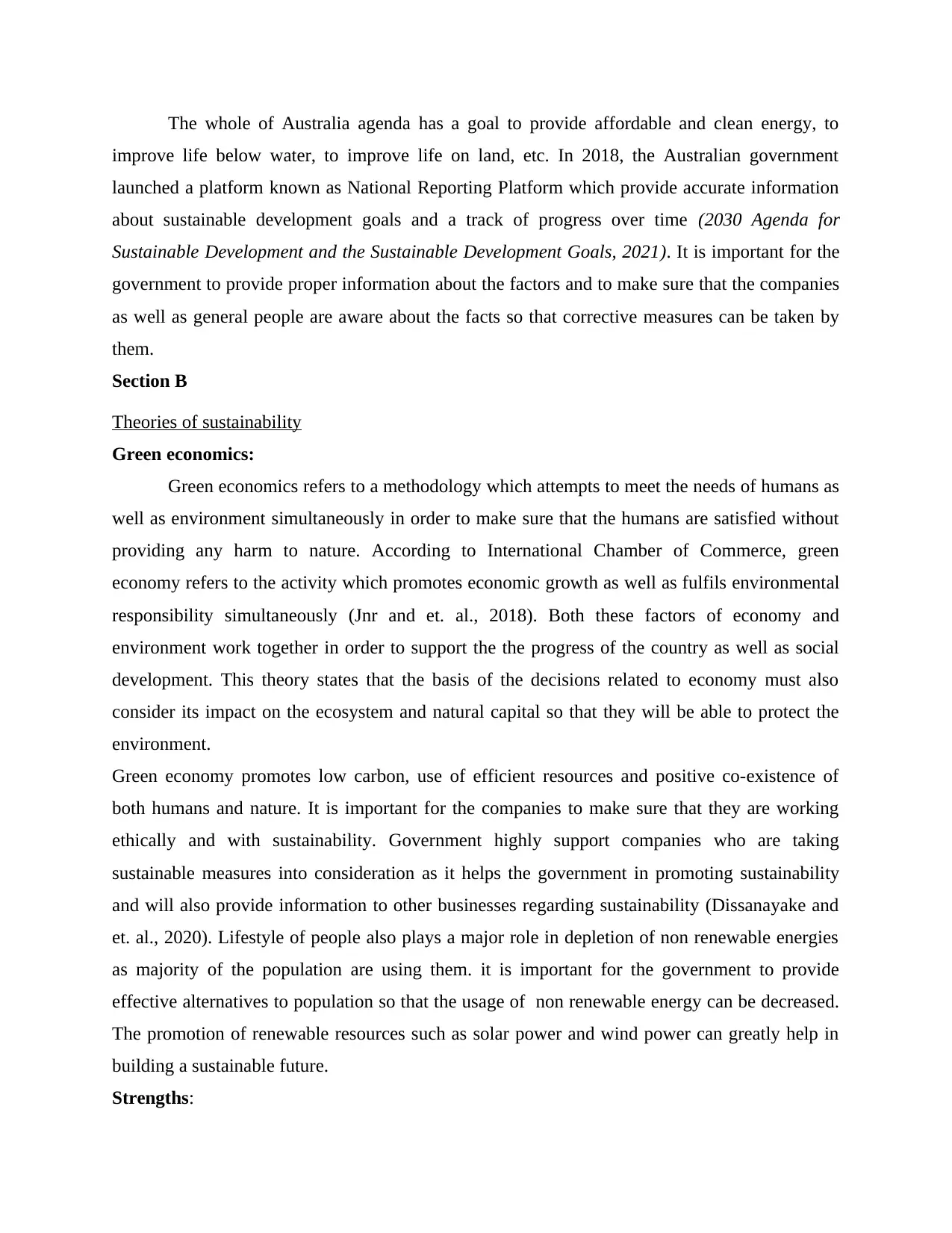
The whole of Australia agenda has a goal to provide affordable and clean energy, to
improve life below water, to improve life on land, etc. In 2018, the Australian government
launched a platform known as National Reporting Platform which provide accurate information
about sustainable development goals and a track of progress over time (2030 Agenda for
Sustainable Development and the Sustainable Development Goals, 2021). It is important for the
government to provide proper information about the factors and to make sure that the companies
as well as general people are aware about the facts so that corrective measures can be taken by
them.
Section B
Theories of sustainability
Green economics:
Green economics refers to a methodology which attempts to meet the needs of humans as
well as environment simultaneously in order to make sure that the humans are satisfied without
providing any harm to nature. According to International Chamber of Commerce, green
economy refers to the activity which promotes economic growth as well as fulfils environmental
responsibility simultaneously (Jnr and et. al., 2018). Both these factors of economy and
environment work together in order to support the the progress of the country as well as social
development. This theory states that the basis of the decisions related to economy must also
consider its impact on the ecosystem and natural capital so that they will be able to protect the
environment.
Green economy promotes low carbon, use of efficient resources and positive co-existence of
both humans and nature. It is important for the companies to make sure that they are working
ethically and with sustainability. Government highly support companies who are taking
sustainable measures into consideration as it helps the government in promoting sustainability
and will also provide information to other businesses regarding sustainability (Dissanayake and
et. al., 2020). Lifestyle of people also plays a major role in depletion of non renewable energies
as majority of the population are using them. it is important for the government to provide
effective alternatives to population so that the usage of non renewable energy can be decreased.
The promotion of renewable resources such as solar power and wind power can greatly help in
building a sustainable future.
Strengths:
improve life below water, to improve life on land, etc. In 2018, the Australian government
launched a platform known as National Reporting Platform which provide accurate information
about sustainable development goals and a track of progress over time (2030 Agenda for
Sustainable Development and the Sustainable Development Goals, 2021). It is important for the
government to provide proper information about the factors and to make sure that the companies
as well as general people are aware about the facts so that corrective measures can be taken by
them.
Section B
Theories of sustainability
Green economics:
Green economics refers to a methodology which attempts to meet the needs of humans as
well as environment simultaneously in order to make sure that the humans are satisfied without
providing any harm to nature. According to International Chamber of Commerce, green
economy refers to the activity which promotes economic growth as well as fulfils environmental
responsibility simultaneously (Jnr and et. al., 2018). Both these factors of economy and
environment work together in order to support the the progress of the country as well as social
development. This theory states that the basis of the decisions related to economy must also
consider its impact on the ecosystem and natural capital so that they will be able to protect the
environment.
Green economy promotes low carbon, use of efficient resources and positive co-existence of
both humans and nature. It is important for the companies to make sure that they are working
ethically and with sustainability. Government highly support companies who are taking
sustainable measures into consideration as it helps the government in promoting sustainability
and will also provide information to other businesses regarding sustainability (Dissanayake and
et. al., 2020). Lifestyle of people also plays a major role in depletion of non renewable energies
as majority of the population are using them. it is important for the government to provide
effective alternatives to population so that the usage of non renewable energy can be decreased.
The promotion of renewable resources such as solar power and wind power can greatly help in
building a sustainable future.
Strengths:
Paraphrase This Document
Need a fresh take? Get an instant paraphrase of this document with our AI Paraphraser
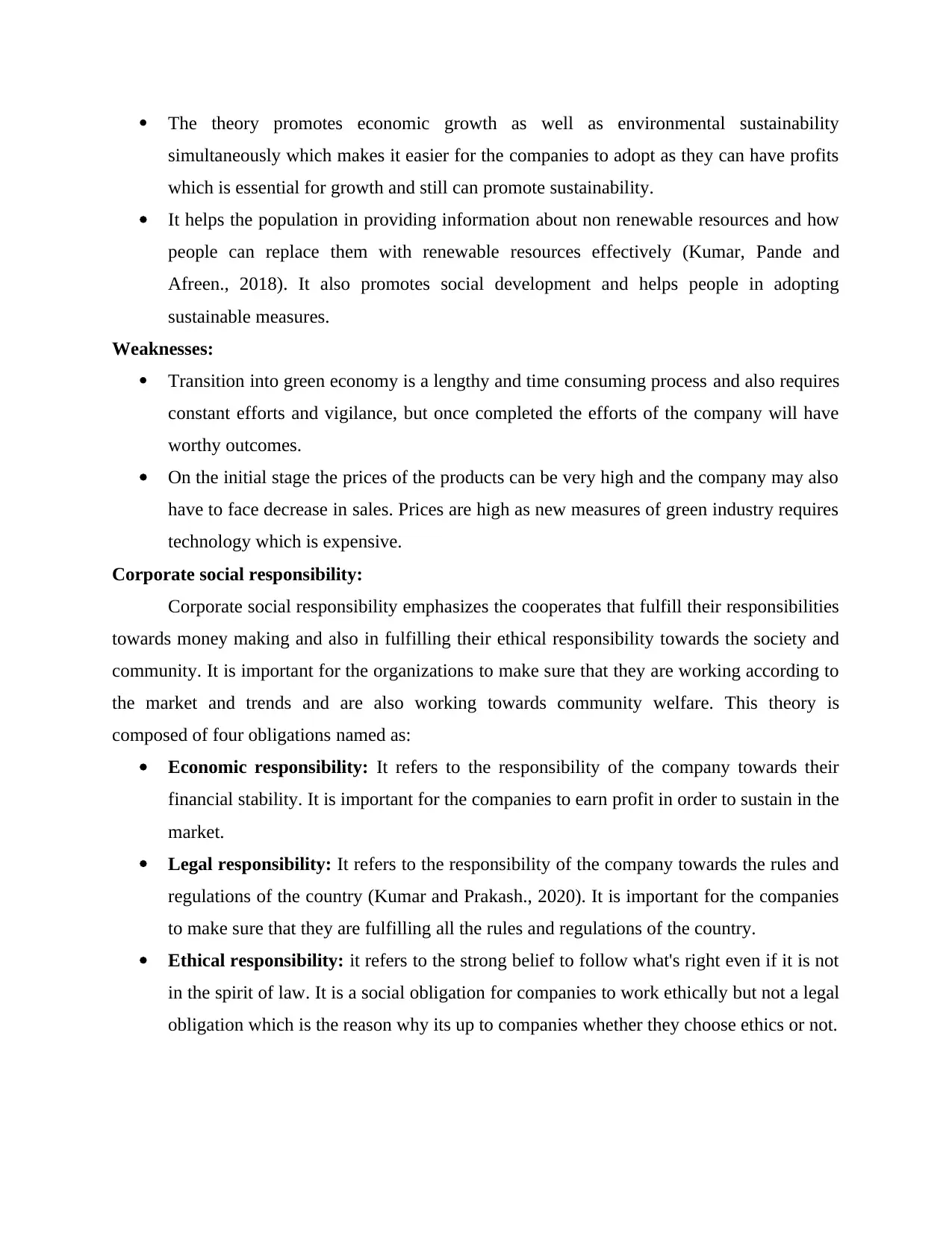
The theory promotes economic growth as well as environmental sustainability
simultaneously which makes it easier for the companies to adopt as they can have profits
which is essential for growth and still can promote sustainability.
It helps the population in providing information about non renewable resources and how
people can replace them with renewable resources effectively (Kumar, Pande and
Afreen., 2018). It also promotes social development and helps people in adopting
sustainable measures.
Weaknesses:
Transition into green economy is a lengthy and time consuming process and also requires
constant efforts and vigilance, but once completed the efforts of the company will have
worthy outcomes.
On the initial stage the prices of the products can be very high and the company may also
have to face decrease in sales. Prices are high as new measures of green industry requires
technology which is expensive.
Corporate social responsibility:
Corporate social responsibility emphasizes the cooperates that fulfill their responsibilities
towards money making and also in fulfilling their ethical responsibility towards the society and
community. It is important for the organizations to make sure that they are working according to
the market and trends and are also working towards community welfare. This theory is
composed of four obligations named as:
Economic responsibility: It refers to the responsibility of the company towards their
financial stability. It is important for the companies to earn profit in order to sustain in the
market.
Legal responsibility: It refers to the responsibility of the company towards the rules and
regulations of the country (Kumar and Prakash., 2020). It is important for the companies
to make sure that they are fulfilling all the rules and regulations of the country.
Ethical responsibility: it refers to the strong belief to follow what's right even if it is not
in the spirit of law. It is a social obligation for companies to work ethically but not a legal
obligation which is the reason why its up to companies whether they choose ethics or not.
simultaneously which makes it easier for the companies to adopt as they can have profits
which is essential for growth and still can promote sustainability.
It helps the population in providing information about non renewable resources and how
people can replace them with renewable resources effectively (Kumar, Pande and
Afreen., 2018). It also promotes social development and helps people in adopting
sustainable measures.
Weaknesses:
Transition into green economy is a lengthy and time consuming process and also requires
constant efforts and vigilance, but once completed the efforts of the company will have
worthy outcomes.
On the initial stage the prices of the products can be very high and the company may also
have to face decrease in sales. Prices are high as new measures of green industry requires
technology which is expensive.
Corporate social responsibility:
Corporate social responsibility emphasizes the cooperates that fulfill their responsibilities
towards money making and also in fulfilling their ethical responsibility towards the society and
community. It is important for the organizations to make sure that they are working according to
the market and trends and are also working towards community welfare. This theory is
composed of four obligations named as:
Economic responsibility: It refers to the responsibility of the company towards their
financial stability. It is important for the companies to earn profit in order to sustain in the
market.
Legal responsibility: It refers to the responsibility of the company towards the rules and
regulations of the country (Kumar and Prakash., 2020). It is important for the companies
to make sure that they are fulfilling all the rules and regulations of the country.
Ethical responsibility: it refers to the strong belief to follow what's right even if it is not
in the spirit of law. It is a social obligation for companies to work ethically but not a legal
obligation which is the reason why its up to companies whether they choose ethics or not.
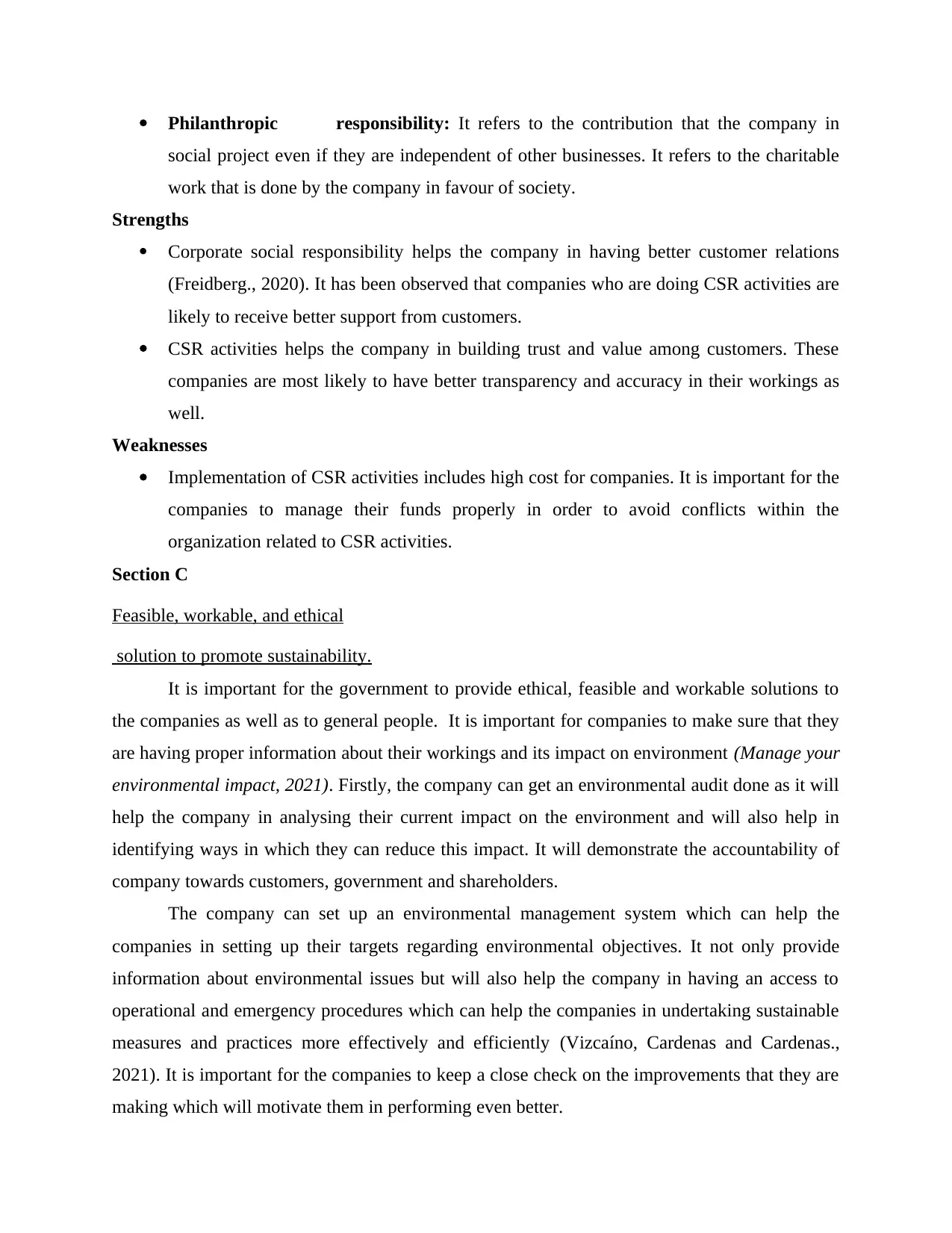
Philanthropic responsibility: It refers to the contribution that the company in
social project even if they are independent of other businesses. It refers to the charitable
work that is done by the company in favour of society.
Strengths
Corporate social responsibility helps the company in having better customer relations
(Freidberg., 2020). It has been observed that companies who are doing CSR activities are
likely to receive better support from customers.
CSR activities helps the company in building trust and value among customers. These
companies are most likely to have better transparency and accuracy in their workings as
well.
Weaknesses
Implementation of CSR activities includes high cost for companies. It is important for the
companies to manage their funds properly in order to avoid conflicts within the
organization related to CSR activities.
Section C
Feasible, workable, and ethical
solution to promote sustainability.
It is important for the government to provide ethical, feasible and workable solutions to
the companies as well as to general people. It is important for companies to make sure that they
are having proper information about their workings and its impact on environment (Manage your
environmental impact, 2021). Firstly, the company can get an environmental audit done as it will
help the company in analysing their current impact on the environment and will also help in
identifying ways in which they can reduce this impact. It will demonstrate the accountability of
company towards customers, government and shareholders.
The company can set up an environmental management system which can help the
companies in setting up their targets regarding environmental objectives. It not only provide
information about environmental issues but will also help the company in having an access to
operational and emergency procedures which can help the companies in undertaking sustainable
measures and practices more effectively and efficiently (Vizcaíno, Cardenas and Cardenas.,
2021). It is important for the companies to keep a close check on the improvements that they are
making which will motivate them in performing even better.
social project even if they are independent of other businesses. It refers to the charitable
work that is done by the company in favour of society.
Strengths
Corporate social responsibility helps the company in having better customer relations
(Freidberg., 2020). It has been observed that companies who are doing CSR activities are
likely to receive better support from customers.
CSR activities helps the company in building trust and value among customers. These
companies are most likely to have better transparency and accuracy in their workings as
well.
Weaknesses
Implementation of CSR activities includes high cost for companies. It is important for the
companies to manage their funds properly in order to avoid conflicts within the
organization related to CSR activities.
Section C
Feasible, workable, and ethical
solution to promote sustainability.
It is important for the government to provide ethical, feasible and workable solutions to
the companies as well as to general people. It is important for companies to make sure that they
are having proper information about their workings and its impact on environment (Manage your
environmental impact, 2021). Firstly, the company can get an environmental audit done as it will
help the company in analysing their current impact on the environment and will also help in
identifying ways in which they can reduce this impact. It will demonstrate the accountability of
company towards customers, government and shareholders.
The company can set up an environmental management system which can help the
companies in setting up their targets regarding environmental objectives. It not only provide
information about environmental issues but will also help the company in having an access to
operational and emergency procedures which can help the companies in undertaking sustainable
measures and practices more effectively and efficiently (Vizcaíno, Cardenas and Cardenas.,
2021). It is important for the companies to keep a close check on the improvements that they are
making which will motivate them in performing even better.
⊘ This is a preview!⊘
Do you want full access?
Subscribe today to unlock all pages.

Trusted by 1+ million students worldwide
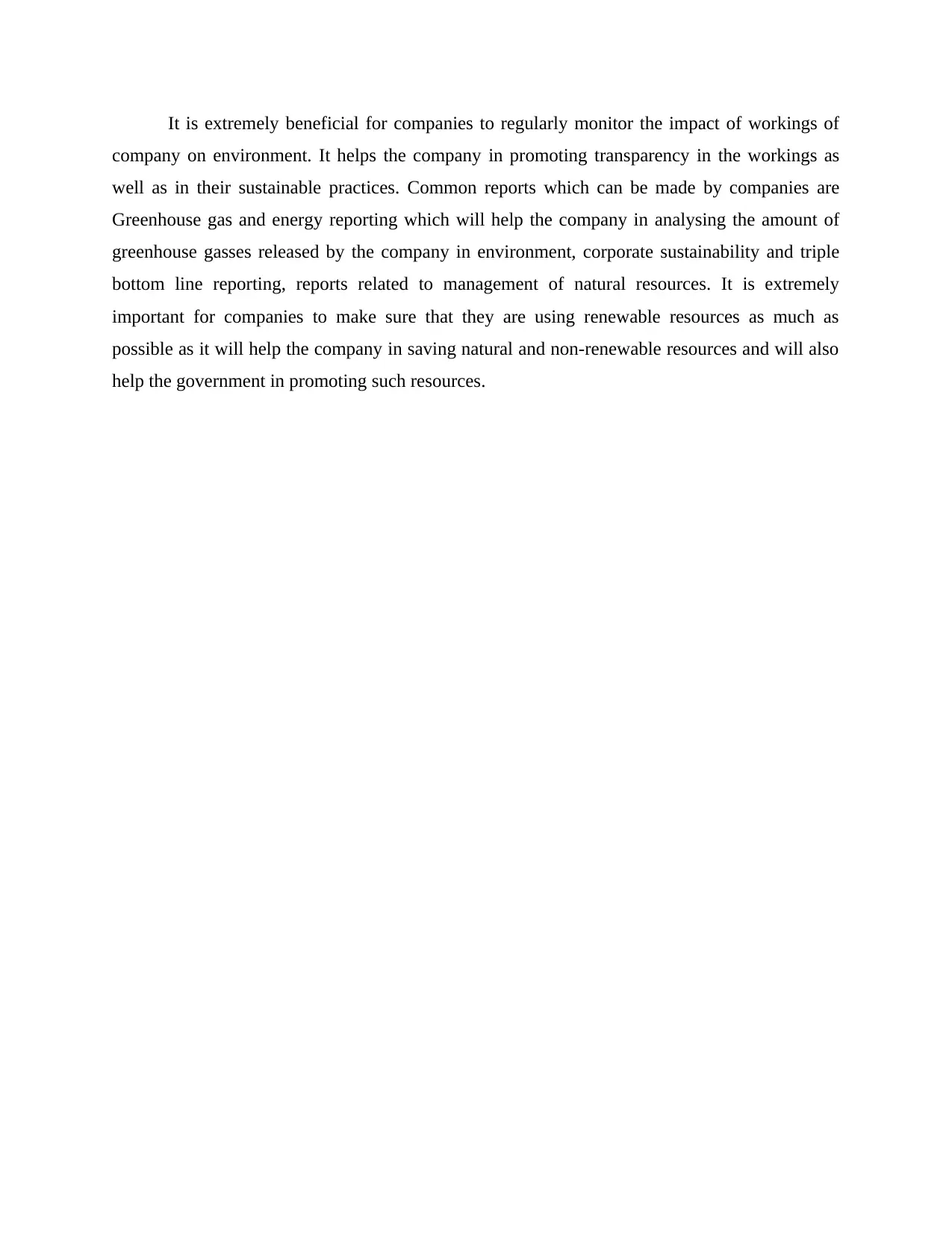
It is extremely beneficial for companies to regularly monitor the impact of workings of
company on environment. It helps the company in promoting transparency in the workings as
well as in their sustainable practices. Common reports which can be made by companies are
Greenhouse gas and energy reporting which will help the company in analysing the amount of
greenhouse gasses released by the company in environment, corporate sustainability and triple
bottom line reporting, reports related to management of natural resources. It is extremely
important for companies to make sure that they are using renewable resources as much as
possible as it will help the company in saving natural and non-renewable resources and will also
help the government in promoting such resources.
company on environment. It helps the company in promoting transparency in the workings as
well as in their sustainable practices. Common reports which can be made by companies are
Greenhouse gas and energy reporting which will help the company in analysing the amount of
greenhouse gasses released by the company in environment, corporate sustainability and triple
bottom line reporting, reports related to management of natural resources. It is extremely
important for companies to make sure that they are using renewable resources as much as
possible as it will help the company in saving natural and non-renewable resources and will also
help the government in promoting such resources.
Paraphrase This Document
Need a fresh take? Get an instant paraphrase of this document with our AI Paraphraser
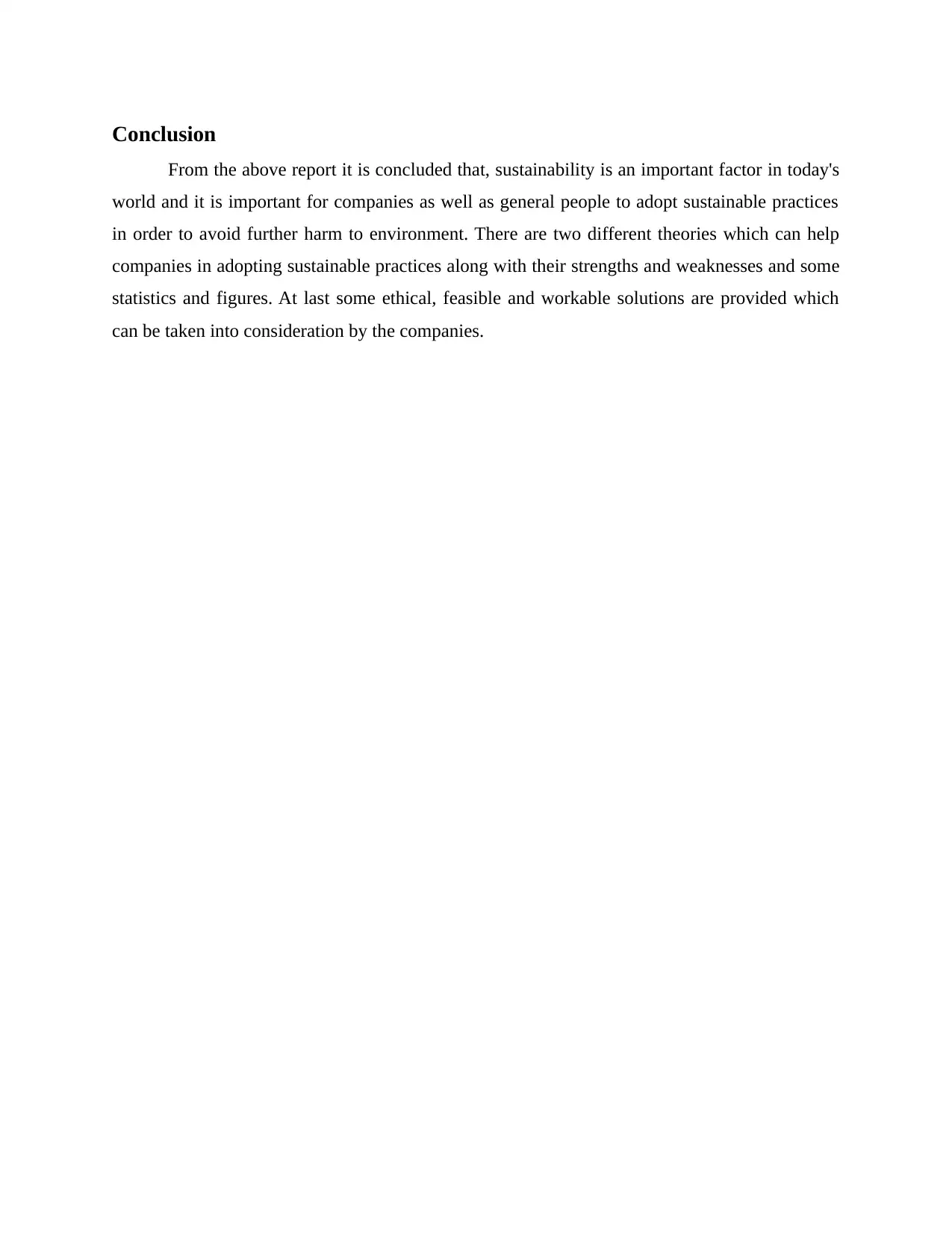
Conclusion
From the above report it is concluded that, sustainability is an important factor in today's
world and it is important for companies as well as general people to adopt sustainable practices
in order to avoid further harm to environment. There are two different theories which can help
companies in adopting sustainable practices along with their strengths and weaknesses and some
statistics and figures. At last some ethical, feasible and workable solutions are provided which
can be taken into consideration by the companies.
From the above report it is concluded that, sustainability is an important factor in today's
world and it is important for companies as well as general people to adopt sustainable practices
in order to avoid further harm to environment. There are two different theories which can help
companies in adopting sustainable practices along with their strengths and weaknesses and some
statistics and figures. At last some ethical, feasible and workable solutions are provided which
can be taken into consideration by the companies.
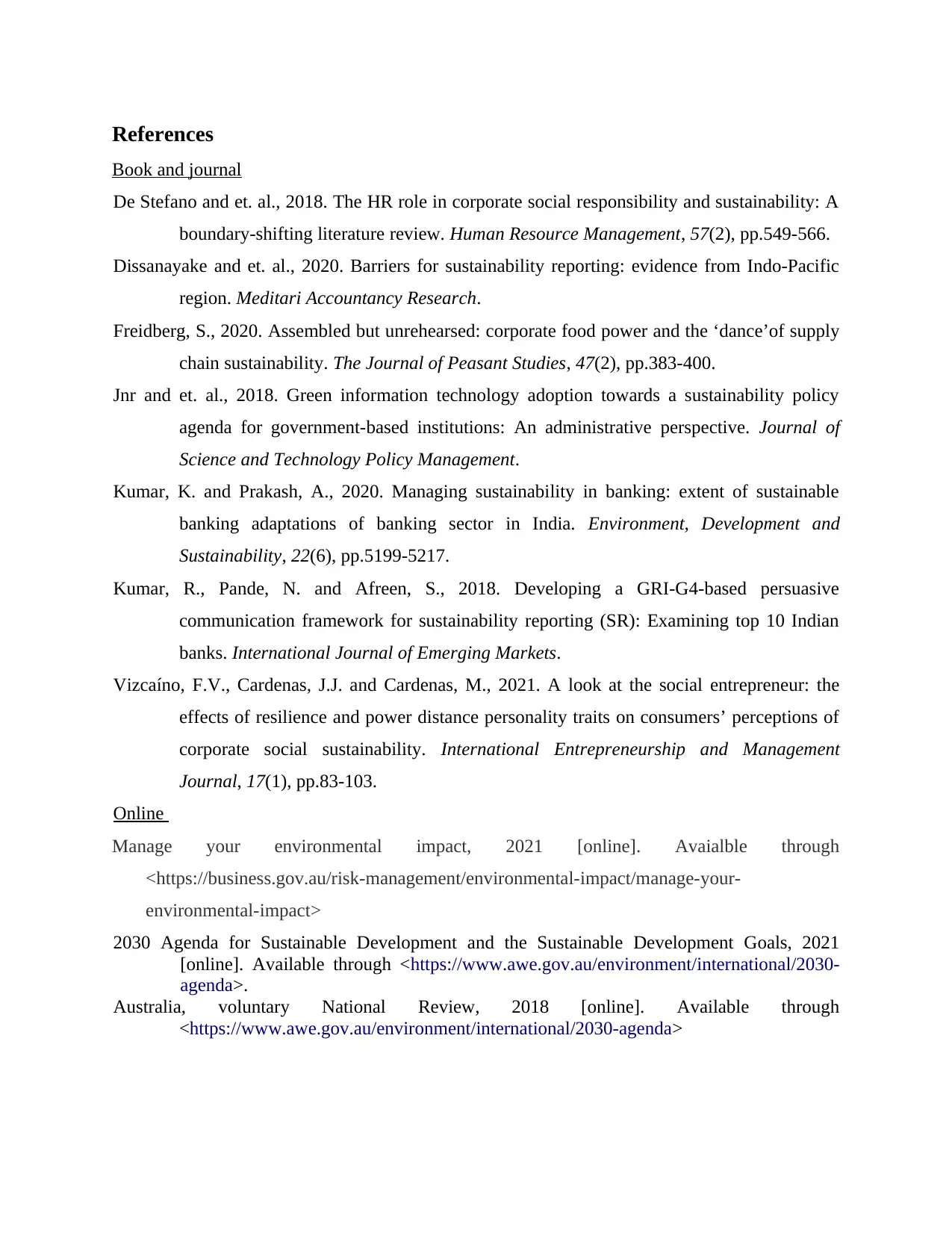
References
Book and journal
De Stefano and et. al., 2018. The HR role in corporate social responsibility and sustainability: A
boundary‐shifting literature review. Human Resource Management, 57(2), pp.549-566.
Dissanayake and et. al., 2020. Barriers for sustainability reporting: evidence from Indo-Pacific
region. Meditari Accountancy Research.
Freidberg, S., 2020. Assembled but unrehearsed: corporate food power and the ‘dance’of supply
chain sustainability. The Journal of Peasant Studies, 47(2), pp.383-400.
Jnr and et. al., 2018. Green information technology adoption towards a sustainability policy
agenda for government-based institutions: An administrative perspective. Journal of
Science and Technology Policy Management.
Kumar, K. and Prakash, A., 2020. Managing sustainability in banking: extent of sustainable
banking adaptations of banking sector in India. Environment, Development and
Sustainability, 22(6), pp.5199-5217.
Kumar, R., Pande, N. and Afreen, S., 2018. Developing a GRI-G4-based persuasive
communication framework for sustainability reporting (SR): Examining top 10 Indian
banks. International Journal of Emerging Markets.
Vizcaíno, F.V., Cardenas, J.J. and Cardenas, M., 2021. A look at the social entrepreneur: the
effects of resilience and power distance personality traits on consumers’ perceptions of
corporate social sustainability. International Entrepreneurship and Management
Journal, 17(1), pp.83-103.
Online
Manage your environmental impact, 2021 [online]. Avaialble through
<https://business.gov.au/risk-management/environmental-impact/manage-your-
environmental-impact>
2030 Agenda for Sustainable Development and the Sustainable Development Goals, 2021
[online]. Available through <https://www.awe.gov.au/environment/international/2030-
agenda>.
Australia, voluntary National Review, 2018 [online]. Available through
<https://www.awe.gov.au/environment/international/2030-agenda>
Book and journal
De Stefano and et. al., 2018. The HR role in corporate social responsibility and sustainability: A
boundary‐shifting literature review. Human Resource Management, 57(2), pp.549-566.
Dissanayake and et. al., 2020. Barriers for sustainability reporting: evidence from Indo-Pacific
region. Meditari Accountancy Research.
Freidberg, S., 2020. Assembled but unrehearsed: corporate food power and the ‘dance’of supply
chain sustainability. The Journal of Peasant Studies, 47(2), pp.383-400.
Jnr and et. al., 2018. Green information technology adoption towards a sustainability policy
agenda for government-based institutions: An administrative perspective. Journal of
Science and Technology Policy Management.
Kumar, K. and Prakash, A., 2020. Managing sustainability in banking: extent of sustainable
banking adaptations of banking sector in India. Environment, Development and
Sustainability, 22(6), pp.5199-5217.
Kumar, R., Pande, N. and Afreen, S., 2018. Developing a GRI-G4-based persuasive
communication framework for sustainability reporting (SR): Examining top 10 Indian
banks. International Journal of Emerging Markets.
Vizcaíno, F.V., Cardenas, J.J. and Cardenas, M., 2021. A look at the social entrepreneur: the
effects of resilience and power distance personality traits on consumers’ perceptions of
corporate social sustainability. International Entrepreneurship and Management
Journal, 17(1), pp.83-103.
Online
Manage your environmental impact, 2021 [online]. Avaialble through
<https://business.gov.au/risk-management/environmental-impact/manage-your-
environmental-impact>
2030 Agenda for Sustainable Development and the Sustainable Development Goals, 2021
[online]. Available through <https://www.awe.gov.au/environment/international/2030-
agenda>.
Australia, voluntary National Review, 2018 [online]. Available through
<https://www.awe.gov.au/environment/international/2030-agenda>
⊘ This is a preview!⊘
Do you want full access?
Subscribe today to unlock all pages.

Trusted by 1+ million students worldwide
1 out of 9
Related Documents
Your All-in-One AI-Powered Toolkit for Academic Success.
+13062052269
info@desklib.com
Available 24*7 on WhatsApp / Email
![[object Object]](/_next/static/media/star-bottom.7253800d.svg)
Unlock your academic potential
Copyright © 2020–2026 A2Z Services. All Rights Reserved. Developed and managed by ZUCOL.




